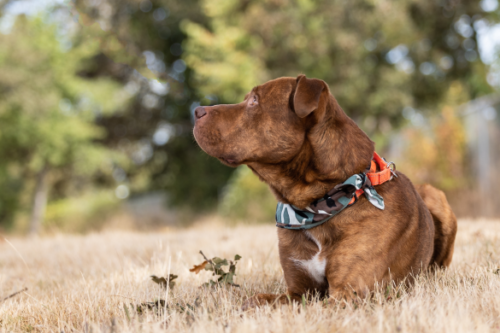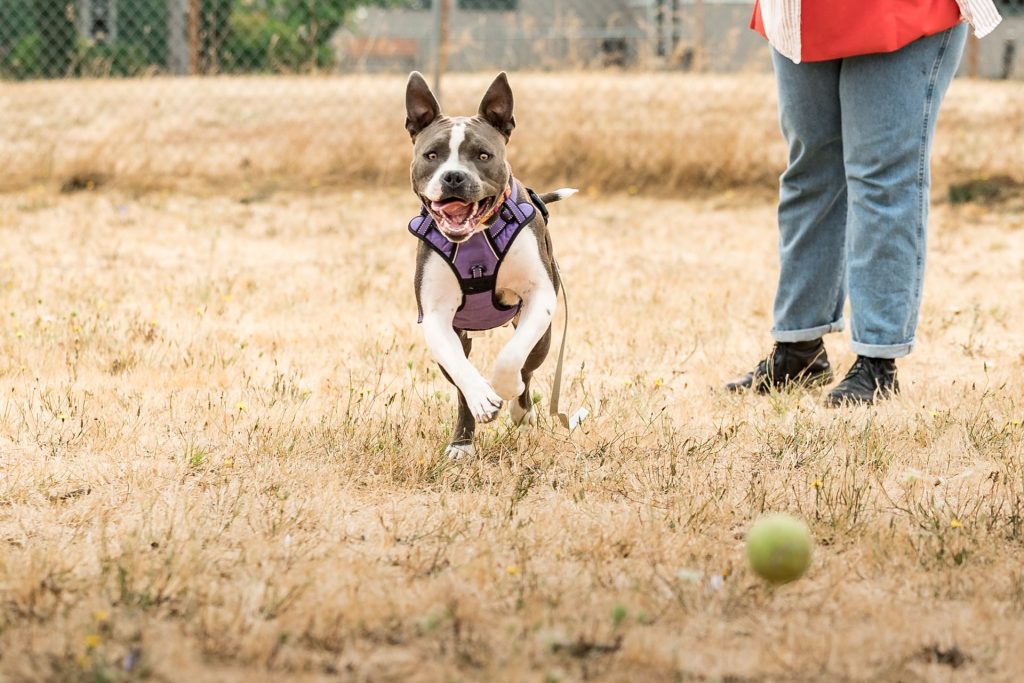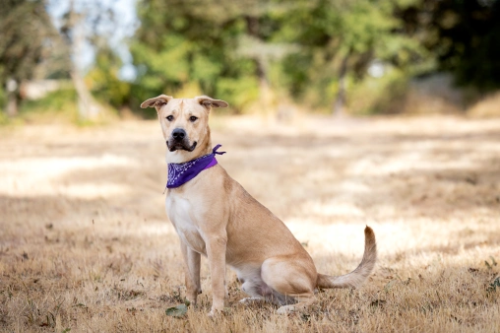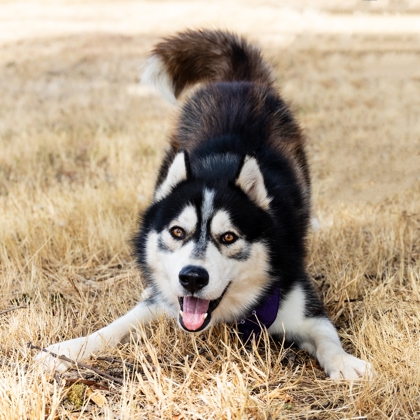Did you know that the Oregon Humane Society Salem Campus has a behavior hotline? Call (503) 585-5900, extension 318. You can also send us a direct message.

Becoming Valuable to Your Dog
One question we often get from folks is how they can get their dog to listen and respond when called.
We understand how frustrating that can be, and that’s why we work with people to learn how to become the thing your dog values the most.
Contrary to popular belief, dogs do not find humans intrinsically valuable. According to a study by Patrizia Piotti and Juliane Kaminski, dogs need external motivation. Once we learn what motivates our dog, we can begin to build a stronger relationship and find more success in training them.

Training for Recall
Calling your dog to come to you from a distance can be a life-or-death situation. For instance, your dog is running away from you towards a busy road. Teaching your dog to come to you reliably takes consistency and generosity on your part.
We teach different techniques for recall in all our group classes. We are consistent, however, in stating the Three Golden Rules of Recall.
1. ALWAYS reward your dog when they come to you, whether you’ve called them or not.
Building a solid relationship with your dog starts with rewarding the behaviors you like. Dogs will repeat rewarded behaviors frequently, again, because they are selfish and want those rewards. This is positive reinforcement (read more in this article on our Portland Campus website). Rewards don’t have to be food; if your dog likes to play with toys or fetch, use that. Another part of this rule is that you need to be more valuable than distractions. Use high pitched tones with your voice. Act goofy. I do jumping jacks or bust out a crazy dance move to get my dogs’ attention. Embarrassment is not a factor; you might be saving your dog’s life.
Don’t ask your dog to come to you if you know they won’t.
You’re at the dog park and your dog is having the best time with their best furry friend, but you want to leave. I’m sorry, but you cannot be more valuable than another dog. You’ll get frustrated trying to get their attention focused on you. In this case, you’ll need to approach your dog and offer some delicious treats to lure them away.
Don’t punish your dog when they come to you.
Punishment is considered anything your dog considers uncomfortable or aversive (read more in the OHS Portland resource document, Problem with Punishment). For example, If your dog doesn’t like to take a bath, asking them to come to you then putting them in the tub will poison your cue. The next time you call your dog they will probably run away from you and hide. To make bath time fun lure your dog to the bathroom with a yummy treat trail. Smear peanut butter on the tub wall for your dog to lick as they get their spa treatment.

Sitting on Cue
Obedience is defined by the Cambridge English Dictionary as “the fact that people or animals do what they are told to do.” From a relationship point of view this definition is one sided. Connection between you and your dog should include reciprocation. Let’s look at asking your dog to sit.
Example scenario:
You have come home from a long day at work. You open the front door, enter, and are greeted by an excited dog who wants your attention right now. They jump up on you, bark, or bite at your clothing. Their greeting is not polite by your standards. Your relationship with your dog becomes strained because they don’t seem to understand what you think is appropriate behavior. How can you improve this relationship situation?
- Sit and treats will rain down upon you. You could have a can of treats stashed outside your front door. Grab a few before entering the house. Say, “sit,” before opening the door. Push your treat-filled hand into the house in front of you. If your dog is sitting, say, “Yes!” and toss the treats on the ground near them. The dog gets what they want, your attention, with treats as a bonus. You get what you want, time to get into the house without being “mugged” by an excited dog. Win-win.
- Give them what they want but show them how you want it. Treats don’t have to be the reward. Walk into the house, drop anything you are carrying, and kneel. When your excited dog approaches you gently put your thumb through their collar to prevent jumping. Pet your dog in long, slow, massaging strokes. Whisper to them. Ask them how their day went. Once they are calm, stand up, pick up your items, and continue entering the house. This method takes more than one time for any dog to figure out that calmness gets them your attention. After several repetitions your dog will sit and wait for you to drop your stuff before approaching. Win-win. Learn more about this technique from Sarah Owings, KPA-CTP.

Stopping Unwanted Behaviors
What does the word “stop” mean to a dog? If, as previously stated, your dog acts with selfish motives, the word “stop” doesn’t get them anything valuable. They might continue the behavior they are doing. Whether it’s jumping up on you, barking, or running away from you, you’ll need to build a trustworthy relationship with your dog if you want them to stop those unwanted behaviors.
Try using positive interrupters. A positive interrupter is a noise or word that interrupts your dog from an unwanted behavior and instantly redirects their attention towards you. Wow, you now exist! Wow, your dog has stopped that unwanted behavior and looked, or even ran, towards you! Reward that behavior with everything you’ve got, and your dog will listen to you anytime they hear that noise.
In the long-term, consistency and rewards work well to change a dog’s feelings about your value to them. We have a group class, Smart Conversations, where you can learn many ways to communicate effectively with your dog.
As always, practice patience.


